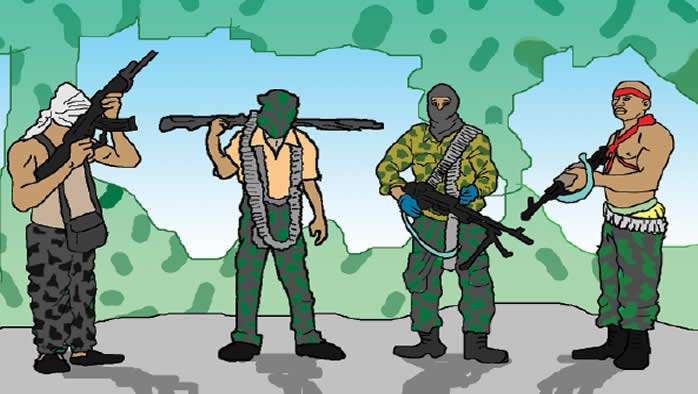
The continent has over 40 per cent of the world’s gold and up to 90 per cent of its chromium and platinum. Moreover, the largest reserves of cobalt, diamonds, platinum and uranium in the world are in Africa. It holds 65 per cent of the world’s arable land and 10 per cent of the planet’s internal renewable fresh water source, according to findings. So the question remains; what roles does Nigeria play where Africa’s wealth is concerned?
Although the mantra of insecurity may have projected Nigeria’s economic importance in Africa as some sort of paradox, it does not change the visibility of the economic importance of Nigeria in Africa ─ in terms of population, mineral resources and human capital. All these exhibit her as a force to reckon with in the continent. Apart from petroleum, Nigeria is well endowed with other natural resources; natural gas, tin, iron, coal, limestone, niobium, lead, zinc, bitumen and arable land, to mention a few. Moreover, the country is also blessed with huge human resources, which unfortunately have been largely untapped. This is, to a large extent, inimical to progress, wealth creation and abundant opportunities for growth and development within the economy.
Without any iota of doubt, Nigeria ranks as first among Africa’s most powerful countries. Truth be told, the issue of security has become a policy mantra to every country of the world. For example, Vision of Humanity in its report stated that; ‘’since 2008, the level of global peacefulness has deteriorated by 2%, with 75 countries recording a deterioration. The average level of global peacefulness has deteriorated for nine of the past 13 years’’. Hence, to opine that the current security situation with which Nigeria is faced is peculiar, is to turn on the phony sanctimony. Every country has its own security challenges, however adequate management of these should be prioritised; it is a prerequisite for economic growth, as well as a developmental paradigm.
Since independence, Nigeria has witnessed crises mainly by political, social and religious factors, and these actually laid the foundation for her economic depression, which is further exacerbated by incessant spate of insecurity (i.e. banditry, terrorism, armed robbery, militancy, kidnapping, ethnoreligious violence, farmer-herder’s conflicts etc.) with a snowball effect. Before now, northern Nigeria was only embroiled in social conflicts and armed violence but today, the situation has transitioned into violent Islamic insurgency, terrorism, armed banditry, kidnapping for ransom, cattle rustling etc.
As a matter of fact, the security landscape of the northern region of the country is currently being outturned by different criminal groups with strong allegiance to continue to terrorise the Locals who are apparently helpless and vulnerable (without noticeable protection from the State). From the North-east to the North-west, and down to North-Central, different armed groups (i.e. bandits, killer herdsmen, terrorists etc.) have demonstrated strong resistance vis-à-vis the intervention of the military and their operations. For example, in 2021 alone, Global Centre for the Responsibility to Protect in its report highlighted the fact that over 2,600 civilians were killed by armed bandits in Nigeria. Recall early January, 2022, over 200 people were killed in Zamfara State by terrorists. Needless to say, many lives have been lost due to the activities of violent non-state actors between then (i.e. January) and now. Therefore, increased attacks by armed bandit groups, as well as continued attacks by Boko Haram and the Islamic State of West Africa, leave civilians at risk of mass atrocity crimes:
Despite government counter-terrorism expenditure and efforts, insecurity proliferates to every part of the country. The prevalence of insecurity in Nigeria appears to be rising and fast evolving into an existential crisis that is shaking the foundation of its nationhood. Hence, the country suffers serious economic depression. It is a known fact that protection of lives and properties against local and international dangers is critical for functioning markets and the incentives to invest and innovate. This explains why countries around the world would not only invest heavily in their security but also ensure it is adequately maintained within and beyond their borders.
A general assessment of Nigeria’s security situation is indicative of the fact that the country has not been well managed. Almost every sector of its economy has suffered significant setbacks, more especially, in recent times. The agricultural sectorperhaps has the largest share of the problem because many farmers have been forced to abandon their farmlands due to fear of being kidnapped! Moreover, the highways through which farm produce is conveyed or distributed to the various parts of the country are no longer considered safe due to several reported cases of kidnapped commuters. Cattle raiding has also become the order of the day in most communities across many northern states. This has multiplied effects in the rise of food insecurity in the country. The UN Refugee Agency in its report, recorded that over 2.1 million had been internally displaced in Nigeria due to the heightened level of insecurity:
Nigeria continues to lose a good number of its professionals (those in health and in academia inclusive) to foreign countries; highly skilled professionals are migrating to developed economies (i.e. United Kingdom, Canada, United States of America, Ireland, Australia etc.) it its recent public statement, the Nigerian Medical Association remarked that ’’no fewer than 10,000 doctors left Nigeria for the United Kingdom, for greener pastures in the last seven years’’. Moreover, the upsurge in the number of visa applicants generally at the various embassies in the country calls for concern. A recent statistical data released by the World Bank revealed that in the Human Capital Index, Nigeria ranks 150 out of 157 countries in 2020! There is no better way to express that the country needs immediate resuscitation.
Recently, some embassies gave security notices and ordered immediate evacuation of their staff from Nigeria. The United States, in particular, granted authorised departure status to their diplomatic mission in the Federal Capital Territory, Abuja, which permits the voluntary departure of family members and certain employees due to the heightened risk of terrorist attacks (based on intelligence) in the country. All these are quite indicative of serious security problems. Hence, the current administration has failed to demonstrate capacity and ability vis-à-vis its core responsibility as a government. And this failure has become very obvious from all indications.
No doubt, good governance, provision of a safe and secure environment for human capital development and businesses, improved access to social and economic services, may not completely terminate security challenges in any society, but it will reduce the impact it may have on the economy by curbing the anomalies to manageable extent while reducing poverty, increasing revenue and engendering long-term inclusive growth. All these will never materialise without exhibiting some level of significant political will. As it stands, the reigns of the current government will come to an end in 2023, but the question remains; has the administration of the President, Major General Muhammadu Buhari (retd.), demonstrated the required political will to deal with Nigeria’s incessant security challenges in order to save the beleaguered nation from a continuous fall?
In conclusion, what should be the main focus of the next administration, after the general election of 2023, is to critically address the issues of security as quickly as possible. Even though, this may seem like a Sisyphean task, but with adequate supports for the military and other departments of the security forces and, of course, the needed political will, the tension, which has saturated the Nigerian socio-political and economic space, for quite some time now, may gradually ease off, thereby setting the country up as an attractive hub for both local and foreign investors.
Adeparusi, an independent researcher and UK-based criminologist, wrote in via [email protected]








